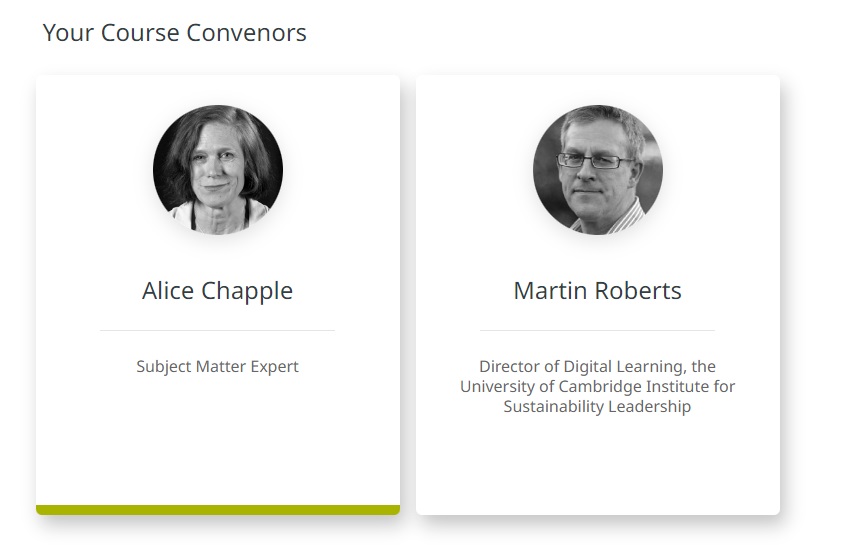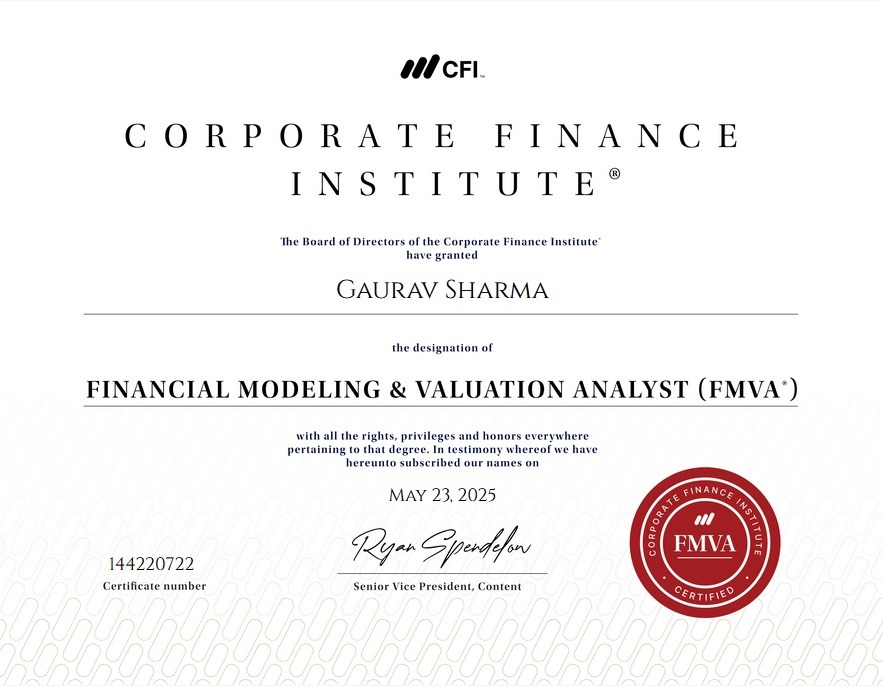As per a recent HSBC survey, 89% of institutional investors believe that social and environmental issues are important to them. Its apparent that ESG is increasingly becoming a core part of investment policy and philosophy with firms scrambling to find experts with the skills and knowledge to help formulate and implement their ESG policies. This trend will continue for the coming decades and anyone not onboard is likely to be left behind.
This shift in priorities is mostly led by a generation of highly educated and environmentally conscious professionals and it’s a cause that I personally champion as well. The financial services industry has to transition with the times, and it is up to us to lead that change. These courses and certifications have been designed to teach the principles and concepts of sustainable finance and ESG Investing and help you become a leader in the field.
1. Sustainable Finance from University of Cambridge
Who is this for?
This course focuses on both the macro and micro level of sustainable finance which means it is well suited for professionals at all levels of experience. The target audience is primarily investment managers, asset/ portfolio managers, bankers, market analysts but also policy makers, NGOs, regulators, advisors and consultants.
Course Review
If you are looking for a course that captures the social and regulatory aspect of sustainable finance in addition to the financial aspect, then this should be your top pick. You start off with a deep dive into capital flows and allocation in sustainable industries as well as strategies for scaling, effectiveness, risk mitigation etc. Its a comprehensive offering that has you covered from most angles.
I like the focus on rewiring how we think about returns when it comes to sustainable investment. This includes value creation, risks that were previously ignored, systematic thinking and a departure from “short-termism”. Its a fresh take and I hope this starts being reinforced at business schools too.
The public sector also gets a lot of attention which is good to see as governments have a key role in leading the change because of the social impact of sustainable finance. Innovative and disruptive megatrends get a dedicated module which is good to see as these will likely be the drivers over the coming years.

Sustainable Finance requires a rewiring of certain principles including risk, how we measure returns and how everyone is incentivized. These concepts are still being understood and established and now is the perfect time to familiarize yourself with these concepts. And the course does a great job of that by having several modules dedicated to this.
If you are looking for a personal branding boost, Cambridge is of course a great brand to have on any CV or LinkedIn profile.
Click here and use code GS-AF-BBD15 for a 15% discount on this course!
Summary
| Duration | 6 weeks, about 7 hours a week |
| Format | Self-paced, fully online |
| Level | Executive |
| Certificate of Completion | Yes |
2. Sustainable Finance and Investment from Yale School of Management
Who is this for?
This is an executive level program designed for business leaders and professionals in managerial positions who are decision makers and set the course for their companies or organizations. Given its finance focus, its best suited for bankers, investment professionals, asset managers and related roles.
Course Review
If you are looking for a strategic level course that provides the tools, concepts, frameworks and decision points you need for sustainable finance and investment, then this is the course for you. As this is an executive level course, its best suited for senior mangers or business leaders.
The topics are not overly complex or quant-heavy but an understanding of financial terms is required. Topics like sustainable investment strategies and associated risks, ESG trends, metrics and data, asset pricing, portfolio management, metrics and investment products etc. are covered.
Essentially, this is an investment course with a specific focus towards ESG and sustainable investment. The main difference is how goal setting and performance metrics change. This will help you a lot if you are from banking, asset management, investment advisory or even a corporate finance background.
This is an excellent opportunity for some solid personal branding and building some solid ESG credentials.
Click here and use code GS-AF-BBD15 for a 15% discount on this course!
Summary
| Duration | 6 weeks, about 5-8 hours a week |
| Format | Self-paced, fully online |
| Level | Executive |
| Certificate of Completion | Yes |
3. Oxford Leading Sustainable Corporations Programme
Who is this for?
Business Leaders working to create sustainable corporations.
Course Review
While the other courses on this list focus strongly on finance, this course has a wider scope. Significant portions of the course are spent discussing value creation by coronations in the context of not just capitalism but also their impact on other stakeholders. Discussion of topics like climate change, natural capital management and social sustainability is done but within the context of corporate management. What roles corporations play here and how they can respond to the many challenges in a rapidly changing world.
Corporate governance is one of the most important things I look at when investing in companies and courses like this are exactly the management of these companies need. Sustainability is not just something to be looked at in the environment or social context, but also from a risk management context. Corporate structures and systems need to be made more robust and there is plenty of focus on that as well.
Click here and use code GS-AF-BBD15 for a 15% discount on this course!
Summary
| Duration | 6 weeks, about 7-10 hours a week |
| Format | Self-paced, fully online |
| Level | Executive |
| Certificate of Completion | Yes |
4. Environmental Social & Governance (ESG) Specialization from CFI
Course Review
The Corporate Finance Institute is a leader in financial education and offers several high-profile financial certifications. This particular ESG specialization is one of their newer offerings, but it is backed by a lot of experience in providing quality financial training. Their reputation in the industry reflects positively on everyone who has a CFI certification on their LinkedIn profiles or Resume.
There are seven modules or courses that make up the certification. You start off with a general introduction to ESG that teaches you the fundamentals. These modules cover a lot of ground and cover topics ranging from ESG disclosures to financial analysis. ESG disclosures need to be well made and you will learn the best practices so that ESG risks can be properly understood.
ESG investing is the next area of focus, and a lot of time is spend explaining novel concepts that even finance pros will find useful. You will learn how ESG factors and initiative impact financial performance, how to model these into a financial model, how to objectively measure their effects and so on. Such concepts are always tricky in finance but CFI has done a good job of making them objectively measurable enough to be part of an Excel model. There is also a pretty massive case study here that really drives home the point.

The last few modules cover greenhouse gas accounting, carbon markets, human capital management and other such novel concepts. You are pretty much at the bleeding edge of finance here as these are ideas that are just being explored and experimented on. The consensus is yet to be built on how these should be evaluated and now is your time to get in.
Learning about sustainable finance and ESG is our opportunity to feel what it is like being on the ground floor of a revolution in finance. Which is why I highly recommend this course to anyone genuinely interested in the future and shaping the industry.
Click here and use code BBD10 for a 10% discount!
Summary
| Duration | 30-35 hours |
| Format | Self-paced, fully online |
| Level | Intermediate |
| Certificate of Completion | Yes |
5. Climate Change and Sustainable Investing Specialization from EDHEC
Course Review
EDHEC is a premier European business school offering industry leading programs and courses. They have several online course offerings that we have reviewed on BankersByDay and this one on sustainable investment is equally impressive and worth adding to your CV.
The core aim of this course is to demystify the relationship between climate change and economy/ Finance. The financial world has a key role to play in solving this crisis, along with scientific, engineering and economic efforts. The courses in module each focus on one of these areas and cover them all one-by-one.
First up is the science and engineering of climate change so lay the groundwork of the problem. Economics and policies are up next with a deep dive into the main approaches used by economists and governments to help reduce emissions. The best solutions are ones that are self-perpetuating and that is what economists hope to create. And you will learn about the all the key ideas in this sphere.
Financing and investing constitute the latter half of this specialisation with dozens of hours spent on various topics. This includes household, government and corporate investment, investor-led decarbonization of business processes, issuance of green securities, central bank efforts and other such tools. You will also learn about the methods used to identify, measure and reward financial investments that help tackle climate change.
Summary
| Duration | About 35-40 hours |
| Format | Self-paced, fully online |
| Level | Beginner |
6. ESG Investing: Financial Decisions in Flux Specialization
Course Review
This specialization comes from a professional online trading solution provider meaning you can expect a lot of practical and real-world insights. This is a more beginner friendly course that captures the essence of sustainable investing and offers practical tips.
The specialization features several detailed courses on each aspect of ESG investing. Identifying the goals and objectives of ESG investing, what each facet really means, how it deals with ethical, financial issues while ensuring investment returns and minimal risks. You will also lean about how certain industries are being transformed by this – from energy and oil to commodities, agri-products, forest products and so on.
The financial aspects of ESG are given due focus of course. Getting the financing right is a key cornerstone of successfully creating sustainable business solutions. This course teaches you about green assets that are the centerpieces of sustainable financing. This also includes green bonds, ESG-themed ETFs, social bonds, sustainability-linked bonds, climate awareness bonds etc. Such assets are attracting investments not just from activist investors, but also from trillion-dollar pension funds, sovereign wealth funds, mutual funds etc.
The last course is an interesting one as it features data and accountability. The aim is to teach you to identify real ESG efforts and to distinguish them from deceptive attempts and marketing tactics (aka greenwashing) to cover up non-genuine projects. You will also learn to use automation, big data and AI to monitor and track such projects for compliance.
Summary
| Duration | About 60-80 hours |
| Format | Self-paced, fully online |
| Level | Beginner |
7. MicroMasters® Program in Economics and Policies for a Circular Bio-Economy from Wageningen University
Course Review
This is one of the bigger programs in this list and is ideal for those looking for a more comprehensive deep dive into the topic. edX is a platform created by Harvard and MIT and this MicroMasters programs is exactly what that name suggests. So expect some in-depth coverage.
There are several sub-courses that cover one aspect of the topic in detail. You will start with energy and how the move from fossil resources needs to be managed. From there, we move on to all the economic policies. A circular economy is necessary for sustainable finance and managing this transition is a tricky nut necessary component. There’s a lot to cover here from life cycle assessment to transition management, agent-based modelling etc.
Economics and policies are the next subjects to be discussed with several weeks being spent on macro modelling, biofuel policies and economics, and concepts like irreversibility effect.
There is a capstone project that will help cement all that you have learned with a real-world project that you must complete to earn your certification.
Summary
| Duration | Around 6 months |
| Format | Self-paced, fully online |
| Level | Beginner |
8. Principles of Sustainable Finance from Erasmus University Rotterdam
Course Review
Erasmus University is a top rankled international research university base in the Netherlands with several excellent courses on topics ranging from wealth management to governance. This particular does an excellent job of explaining how the finance industry may be mobilized to achieve sustainable development goals.
This is a relative short course, but there are plenty of videos and readings to keep you busy and give you everything you need to. Think of it as a more condenses option. Economic concepts like business true pricing, integrated value, long-term value creation and dozens more that are necessary for sustainable finance are explored here.
Creating a sustainable company and business model is crucial and these are explored from the perspective of investors and shareholders. Concepts like materiality, stakeholders, the purpose of companies in this new era etc. are explored and there are plenty of case studies and examples to help you guide along.
Summary
| Duration | About 15 hours |
| Format | Self-paced, fully online |
| Level | Intermediate |
9. The Economics of Energy Transition from TU Delft
Course Review
No discussion on sustainable finance is complete without talking about energy. The energy sector is a massive emitter and also a major consumer of financial products and services. Transitioning this sector into a sustainable engine of growth is a major requirement and also the focus of this professional certificate.
TU Delft is the oldest and largest Dutch technical university and ranked one of the top engineering and technology universities in the world. For finance topics that require an engineering angle, I always try and include them in my lists as its hard to go wrong with the sort of technical insights they provide.
The first half of the course focuses on the existing energy market. What affects it, what makes it tick, how capacity is managed, energy networks, congestion management etc. This lays the groundwork for the problem that needs to be solved.
The second half of the course focuses on the transition of this sector for the decarbonized economy of tomorrow. You will spend time on topics like renewable energy options, the economics of renewable energy, decarbonization and carbon markets, the future planning of the EU for the energy markets and so on.
Summary
| Duration | 3 months |
| Format | Instructor-led, fully online |
| Level | Advanced |
10. Professional Certificate in Sustainable & Inclusive Landscapes from Wageningen University
Course Review
This course focuses on sustainable and inclusive landscape and the role this will play in achieving Sustainable Development Goals (SDGs). This is a complex and multi-disciplinary issue and requires tacking the issue from multiple aspects to improve the major landscape issues.
A new form of leadership is discussed with a focus on human resource skills, conflict management and distributed leadership. Landscape governance is covered with efforts surrounding institutions, policies, stakeholder management and actionable output.
Lastly, we focus on investments in sustainable landscapes. Financing sources, investments, business cases etc that are the focal points of sustainable finance. Climate finance is one of the more interesting topics covered in this course and something you should look forward to.
Summary
| Duration | 40-50 hours |
| Format | Instructor-led, fully online |
| Level | Advanced |

